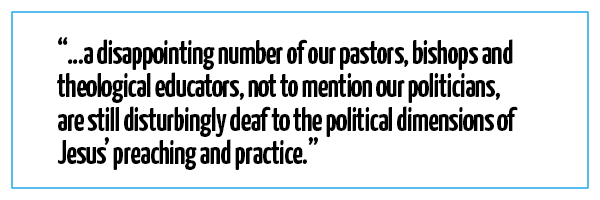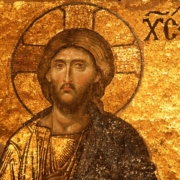A Prophet of God’s Justice: Reclaiming the Political Jesus (Part 1.1)
Chris Marshall | Wednesday, 28th May 2015
INTRODUCTION
In this article I want to offer an appraisal of some of the political themes that emerge in the gospel accounts of the ministry of Jesus. My thesis is radically simple (as well as simply radical)—it is that Jesus was an overtly political figure, that he had an identifiable political platform, and that the political values, commitments and priorities we see displayed in his teaching and praxis ought to play a determinative role in shaping and directing all subsequent Christian engagement in the political process.
So the proposal itself is quite simple. But it is also, in truth, quite radical. It is radical because it contradicts the conventional view of Jesus as a thoroughly apolitical figure, someone who had no interest in, perhaps even an antipathy towards, political activity. According to the usual view, Jesus came as a spiritual saviour, not a political activist. He proclaimed a heavenly kingdom, not a worldly kingdom. He was concerned with the salvation of souls, not with the transformation of society. He called for personal righteousness, not for political change. He may well have had a theology (after all he talked about God a lot), and possibly even an ethics (consider the Sermon on the Mount), but he certainly didn’t have a politics (he had nothing to say about the role of the State, and little more about the state of society).
We are all familiar with this way of thinking. It is taken for granted by many sincere Christians, especially in conservative churches, and is firmly entrenched in the popular imagination as well. A non-political Jesus has been a basic tenet of both Christian piety and a good deal of standard biblical scholarship for a very long time. Preachers and scholars alike have assumed an almost total divorce between the aims of Jesus and the concrete political issues of his day. It is not surprising then that many people today would be perplexed by, or distinctly uncomfortable with, any talk of a political Jesus.
But is a non-political Jesus historically (or even theologically) credible? Is it really possible to isolate Jesus from the social and political problems of his time? Is it true to the gospel narratives to do so? If the kingdom of God which Jesus proclaimed had nothing to do with the kingdoms of this world, why did the worldly rulers of his day conspire to kill him? How could Jesus claim to be the long-awaited royal messiah of Jewish expectation without coming to terms with the political and military implications of that role? Was Jesus the only Palestinian Jewish teacher of his day who was unaffected by the intense sufferings of his people languishing under Roman imperial domination and indifferent to their yearnings for national liberation? And why would the Romans condemn Jesus to death by crucifixion—a form of execution used primarily to intimidate provincial rebels and discourage resistance to imperial rule—if he were merely an innocuous, otherworldly spiritual guide who posed no real threat to Caesar’s dominion? Can Jesus’ death be satisfactorily explained without consideration of his perceived political significance?
Obviously not, as a growing body of Jesus scholarship now recognises. Indeed in their attempt to give account of the historical Jesus, several scholars now appeal to the so-called “criterion of crucifiability”. By this they mean that no putative reconstruction of the life and ministry of Jesus can claim to be historically plausible if it does not adequately explain why he ended up suffering the politically-expressive penalty of crucifixion. Given that crucifixion was reserved mainly for slaves and rebels among subject peoples, the fact that Jesus experienced such a fate must surely indicate that the Romans considered him to be an insurrectionist of at least some kind. The longstanding failure of Christian interpreters to reckon sufficiently with this brute fact betrays, one might suspect, not just a failure of historical imagination, but also an instinctive anti-Judaism (a failure to take seriously Jesus’ role as a first-century Jewish prophet), as well as an incipient Docetism (a failure to take seriously Christ’s full humanity and the historical situatedness of the incarnation).
There is a second reason too why my thesis about the politics of Jesus is more radical than it might appear. To propose, as I have, that the political values and priorities evident in the words and deeds of Jesus ought to exercise normative authority for subsequent Christian political activity is radical because it flies in the face of the way the mainstream Christian Church has itself exercised political power and influence down through much of its history, at least since the time of Constantine. As we will see, in his own teaching and activity Jesus presented a stark alternative to the ruthless and coercive political practices of the Roman Empire and its client Jewish and Herodian rulers, and paid the ultimate price for doing so. Happily Jesus’ alternative political vision was vindicated by God through his resurrection from the dead, and subsequently by the rapid spread of communities of his followers throughout the world professing loyalty to the lordship of Christ rather than to the lordship of Caesar.[1]
But in time the empire struck back. Having failed to suppress the Christian movement by force, it chose to co-opt it. Christianity became the State religion. The maverick Jewish prophet who had inspired this new religious movement was increasingly forgotten, or was rather transposed into a heavenly imperial lord who, on the one hand, secured eternal salvation for the faithful by the merits of his death and resurrection, and, on the other hand, authorised the existing empire to carry on its politics much as before, though with some modifications. It wasn’t long before the institutional church itself began to replicate in its own life and behaviour the hierarchical structures and coercive instincts of the wider imperial order, craving prestige and honour for its bishops and clerics and promoting its own self-interest on earth by a pernicious combination of flattery and battery.[2]
In this new Christendom setting, to be a Christian no longer required, at least for the majority of believers, and certainly not for those in positions of authority, any conscientious commitment to the egalitarian and peacemaking politics of Jesus of Nazareth. It simply required the good fortune to have been born into the Christian empire, and the good sense to subscribe to orthodox Christian belief. In Christendom’s orthodoxy the figure of Christ came to function more as the central link in the doctrine of salvation than as a meaningful paradigm for Christian values and praxis. Tellingly the church’s historic creeds are all but silent on ethics in general, and on the strenuous ethical demands of Jesus in particular. Arguably it is this omission that allowed the church historically to bear the name of Christ yet do the work of the devil at the same time. In the interests of doctrinal orthodoxy, the church raised armies and waged war, tortured heretics and burned witches, persecuted dissenters and compelled conversions. It was only able to do so because it had first depoliticised the teaching and example of Jesus; it had silenced the prophetic voice which had once railed against oppression and hierarchical domination. Thankfully the church no longer burns witches or deploys its own armies. But most confessing Christians, and a disappointing number of our pastors, bishops and theological educators, not to mention our politicians, are still disturbingly deaf to the political dimensions of Jesus’ preaching and practice, and to its far-reaching implications for shaping an authentically Christian political witness today. But why is this the case? Why do modern readers of the gospels still commonly, if not completely, miss the political ramifications of Jesus’ proclamation? And why is it that today’s Christian voice in the public square is so often bereft of any anchoring in the story of Jesus, whether explicit or implicit, thus allowing alternative sources of authority, such as conservative middle class values and morality, to fill the vacuum? Whence comes this depoliticised Jesus?
Thankfully the church no longer burns witches or deploys its own armies. But most confessing Christians, and a disappointing number of our pastors, bishops and theological educators, not to mention our politicians, are still disturbingly deaf to the political dimensions of Jesus’ preaching and practice, and to its far-reaching implications for shaping an authentically Christian political witness today. But why is this the case? Why do modern readers of the gospels still commonly, if not completely, miss the political ramifications of Jesus’ proclamation? And why is it that today’s Christian voice in the public square is so often bereft of any anchoring in the story of Jesus, whether explicit or implicit, thus allowing alternative sources of authority, such as conservative middle class values and morality, to fill the vacuum? Whence comes this depoliticised Jesus?
THE DEPOLICISATION OF JESUS
There are, I think, five main factors that have permitted, and continue to perpetuate, the profound depoliticising of Jesus that prevails today, both within the church and without.
1. Politics ancient and modern: The first, and most determinative, reason why modern Christians fail to notice the political character of Jesus’ activity is that we work with a very narrow conception of what constitutes “political” activity. We come to the New Testament with the modern dichotomy between church and state in our minds, and think of politics in terms of the science and art of government, the concrete operation of centralised institutional mechanisms for running society. Because Jesus did not form a political party or run for office in the Sanhedrin, because he did not lay down a blueprint for society or theorise about the nature of social or economic institutions, modern readers quickly conclude that he was an apolitical spiritual teacher who kept himself aloof from the sordid realities of political life. He accepted that people owe to Caesar the duties of good citizenship, his real concern was that his hearers rendered unto God what was God’s, namely their wholehearted love and spiritual devotion.
From this it follows that the conflict Jesus is constantly embroiled in in the gospels is to be viewed as a religious conflict with religious leaders over religious issues, not a conflict with political leaders over political issues. Jesus is seen primarily as a religious reformer who evoked predictable hostility from the religious establishment because of his new religious views. This goes hand in hand with the presumption that it is the ethnic identity and religious belief of Jesus’ hearers that are most important for understanding Jesus’ interaction with them, much more so than the enormous social, economic and political disparities that existed among them. Jesus’ contemporaries are all lumped together as “Jews” who adhered to the religion of “Judaism”. All other differences among them in terms of social location and historical experience are considered secondary or even irrelevant to appreciating the thrust of Jesus’ message and the goal of his mission.
But all this is highly questionable. It is patently anachronistic to project onto ancient Jewish society (or any other traditional society for that matter) the modern Western distinction between church and state. Religion, politics and economics formed an indivisible unity in Jewish Palestine, and indeed in antiquity in general. The religious leaders of Jesus’ day also exercised political control, with access to the corridors of power being determined by personal wealth and hereditary claim and hence open to only a tiny elite. The law of Moses was the law of the land, and the Sanhedrin, chaired by the high priest, was the major arm of domestic government. The Temple was the centre of spiritual and civil authority, as well as the powerhouse of the Jerusalem economy and a cause of huge economic strain on the common people. It was also the primary institution for conferring legitimacy on the Rome’s high priestly client rulers, who themselves were finally responsible to the Roman procurator.
From this it follows that Jesus’ conflict with the scribal and priestly authorities, which looms so large in the gospel accounts, was simultaneously a conflict with the political managers of the nation, as well as with those who controlled most of the nation’s wealth, much of which had been expropriated from the peasantry. As Richard Horsley points out, the primary division in first century Palestine was not one between finely nuanced schools of theological interpretation but between the rulers and the ruled, between the tiny minority of wealthy power brokers and their retainers, and the vast majority of ordinary people, who were typically indebted and always vulnerable to abuse.[3] The gospels make it clear that it was to this latter group Jesus primarily directed his mission. It was a target audience which, because of it severely oppressed condition, was already highly politicised; it was perpetually prone to social unrest and a fertile recruiting ground for the many popular movements of protest and revolt that sprung up in Jewish Palestine during the Roman period. To imagine, then, that Jesus could address the liberating message of God’s kingdom (itself a political category) to this exploited and downtrodden group without thereby engaging in political activity, and politics of the most subversive kind, is to fail to reckon with the semantic content of Jesus’ language and the concrete socio-political realities of the period.
It is true, of course, that Jesus did not speculate about the structures of human society in the manner of a Greek philosopher or modern policy maker. He was a prophet not a philosopher. Nor did he lay out a master-plan for the operation of societal institutions. Had he done so, it would have long since become obsolete and irrelevant. But this does not mean that he was indifferent to political affairs. Politics is essentially about the exercise of power—social, economic, cultural, religious and coercive power—in the polis, in society, and about these matters, as we shall see, Jesus had much to say.
Moreover the political ramifications of what he taught and practiced did not escape his opponents. Jesus’ message and lifestyle, his disregard for certain traditions and customs, his accentuation of the Torah’s central imperatives of justice, mercy and faithfulness, his claim to divine authority over the evil powers that oppressed God’s people, his high-handed action in the Temple precincts, his consorting with outcasts sinners, and much more, were perceived by his enemies as a challenge to the very cornerstones of Jewish society and ultimately to the Roman provincial peace.[4] It is not surprising therefore that those most antagonistic to Jesus’ articulation of the rule of God were those in positions of religious, political and military power in the ruling establishment of Israel, both Jewish and Roman. They had a vested interest in the way things were and had most to lose from Jesus’ demand for the reordering of personal and social relationships in accordance with the eschatological will of God.[5]
2. The interpretive grid of post-Enlightenment individualism: A second factor that perpetuates apolitical readings of the Jesus story is the distorting influence of Western individualism. Modern interpreters tend to view Jesus as a solitary figure who interacted with other detached individuals on a one-to-one basis. He did not engage with civic groups or political institutions or social networks but only with receptive (or sometimes hostile) individuals, summoning them to personal conversion and spiritual renewal.
Now it is demonstrably true that Jesus interacted with individual personalities, like Nicodemus and Jairus, Bartimaeus and the Roman centurion, the Gerasene demonic and the woman at the well, and he showed a striking respect for individual conscience and choice. It is also true that he required of a select group of his followers a willingness to subordinate the responsibilities of family life to the more urgent demands of extending his message to others. Some individuals had to abandon homes and businesses, and to forego obligations to parents and local communities, in order to join Jesus on his itinerant preaching ministry.[6] In this sense Jesus prioritised individual responsibility over the obligations of social convention. But it would be a huge mistake to conclude from this that Jesus was solely concerned with the spiritual welfare of autonomous individuals or that he encouraged the disintegration of communal life by detaching people permanently from their social environment.
It is crucial to recognise that in pre-modern Jewish society individual identity was inherently relational in character. People derived their sense of selfhood, personal esteem and well-being from their participation in wider social networks, especially those centred on the extended family and the local village community. Western individualism promotes the deception that human personhood and fulfilment are somehow inherent in individuals as free-wheeling, self-aware autonomous agents. The ancients knew better. No person is an island; humanity requires co-humanity; self-knowledge derives from fellowship with others.[7] The reality is that people’s lives are always embedded in social networks and shared cultural traditions. That being so, it would have been impossible for Jesus to address the circumstances of individuals without at the same time affecting the character of the communities to which they belonged, which were in turn deeply affected by the wider patterns of colonial domination and exploitation.
It is worth observing that even when Jesus interacted with individual figures he usually did so in public space, under the notice of the “crowds”. When Jesus visited towns and hamlets to teach and heal, he typically went to the synagogue where the whole village populace would gather. Synagogues in the first-century were not just religious institutions; they were also places where community education, discussion and decision-making took place. They were the local assemblies in which the more-or-less self-governing village communities of Galilee and Judea managed their own affairs. As such they were quasi-political entities, and in visiting them “Jesus was more like a politician on the campaign trail than a schoolmaster … more like a subversive playwright than an actor”.[8]
Read the next instalment in this series here. This article originally appeared in On The Road 32.
[1] Cf. Acts 10:36; Rom 10:9, 12; 1 Cor 12:3; Phil 2:11; Rev 17:14.
[2] Cf. Alan Kreider, The Change of Conversion and the Origin of Christendom (Harrisburg: Trinity, 1999), esp. 33–42.
[3] Richard A. Horsley, Jesus and Empire: the Kingdom of God and the New World Disorder (Minneapolis: Fortress, 2003), 59–60; also William R. Herzog, Jesus, Justice, and the Reign of God: A Ministry of Liberation (Louisville: Westminster John Knox, 2000), 90–108.
[4] Cf. Luke 19:39; John 11:50.
[5] See Christopher D. Marshall, Faith as a Theme in Mark’s Narrative (Cambridge: Cambridge University Press, 1989), 179–82.
[6] On this see the seminal book by Martin Hengel, The Charismatic Leader and his Followers (Edinburgh: T & T Clark, 1981).
[7] On the implications of this for human rights theory, see my Crowned with Glory and Honor: Human Rights ion the Biblical Tradition (Telford: Pandora, 2001).
[8] N.T. Wright, Jesus and the Victory of God (London: SPCK, 1996), 172.
Prof Christopher Marshall is the Diana Unwin Chair in Restorative Justice in the School of Government at Victoria University in Wellington, New Zealand. He specialises in New Testament theology and ethics, peace theology and practice, and restorative justice (both theory and practice), and is an expert in the study of contemporary Anabaptist theology. His books include Beyond Retribution: A New Testament Vision for Justice, Crime and Punishment and Compassionate Justice: An Interdisiciplinary Dialogue with Two Gospel Parables on Law, Crime, and Restorative Justice.





 Because I choreograph movement to further express and explore the concepts in many of my poems, another dimension comes into my emerging-pattern picture. A deep intensification occurs in the “dot-joining” exercise. Perhaps this is a result of mind and body working together, informing each other through their respective and unique dynamics. At times, I experiment with other artforms in conjunction with poetry, such as music, song, film, visual art etc. Sounds a bit endless, I know, but there is a lot of joy to be experienced through humble beginnings, and most of my performance poetry is just that!
Because I choreograph movement to further express and explore the concepts in many of my poems, another dimension comes into my emerging-pattern picture. A deep intensification occurs in the “dot-joining” exercise. Perhaps this is a result of mind and body working together, informing each other through their respective and unique dynamics. At times, I experiment with other artforms in conjunction with poetry, such as music, song, film, visual art etc. Sounds a bit endless, I know, but there is a lot of joy to be experienced through humble beginnings, and most of my performance poetry is just that!